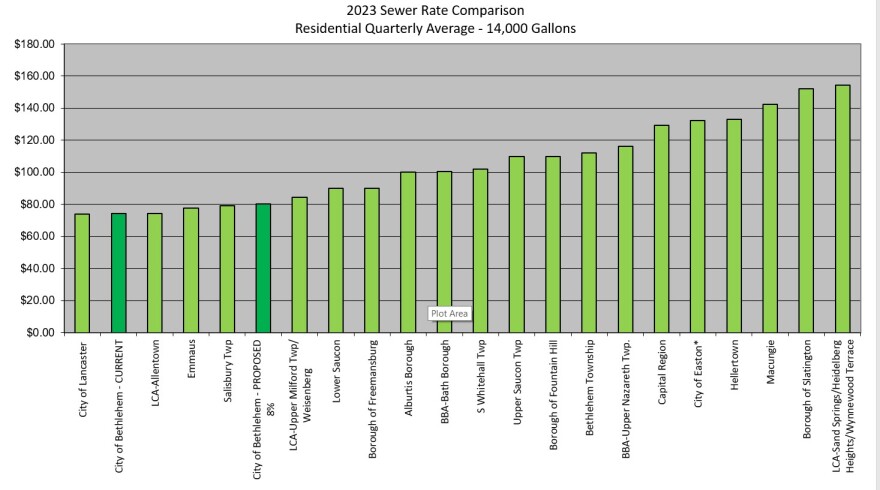- Bethlehem could see an 8% bump in sewer charges come 2024
- That would equal out to about an extra $2 per month
- The city's 2024 budget is set for approval on Dec. 19
BETHLEHEM, Pa. — Sewer officials in Bethlehem are proposing an 8% tax increase for the upcoming year, though the City Council Finance Committee on Wednesday tabled the possibility until further review of the 2024 budget.
If the increase is approved, the average customer can expect about a $2 per month, or $24 per year, increase on their bill. The potential bump would go into effect in January.
Mayor J. William Reynolds is scheduled to present the initial budget on Nov. 14, with hearings scheduled for Nov. 15, Nov. 28 and Dec. 12.
The 2024 budget is set for adoption on Dec. 19.
Previous rate increases
City Water and Sewer Resources Director Edward Boscola said Wednesday that a roughly $2 increase in monthly sewer charges would keep the capital fund in good shape, minimize borrowing and contribute to upcoming projects at the wastewater facility.
From 2020-23, a $3.255 charge per 1,000 gallons treated resulted in a meter charge of $28.71, quarterly bill of $74.28 and annual bill of $297.12.
“It’s a balancing act between trying to keep rates reasonable so you’re making enough money to put towards your capital fund, cover your expenses so you don’t have to borrow as much and keep your debt service low, or reasonable, I should say."Edward Boscola, Bethlehem Director of Water and Sewer Resources
If the proposed 8% tax increase is approved, it would result in a $3.515 charge per 1,000 gallons, a $31.08 meter charge, $80.23 quarterly bill and $320.92 annual bill.
The city has implemented sewer rate increases of 10% in 2017 and 8% in 2020, and saw a 22% bump in revenue from 2016-22 and a 21% increase in expenses during that time, according to data from city water and sewer resources.

Based on a residential quarterly average of 14,000 gallons in 2023, Bethlehem’s proposed tax bump would put resulting bills in the lower cost end of the spectrum, as compared to areas nearby and around the state, Boscola said.
“It’s a balancing act between trying to keep rates reasonable so you’re making enough money to put towards your capital fund, cover your expenses so you don’t have to borrow as much and keep your debt service low, or reasonable, I should say,” Boscola said.
Services for the city, surrounding area
Boscola said Bethlehem owns, operates and maintains the Bethlehem Wastewater Treatment Plant. The city also operates and maintains Hanover Township Collection System through a nearly 60-year agreement, though the township owns the facility.
Bethlehem bills its own city customers as well as those from Hanover Township.
The city collects and treats waste from 11 other tributary municipalities, but those own and maintain their own systems as well as charge their own service rates.
“Any development that you see does increase revenues a little bit — maybe one to two-percent a year — but it’s not enough to keep up with inflation. So you have to raise rates; that’s the only way we can keep the water and sewer fund solvent.”Edward Boscola, Bethlehem Director of Water and Sewer Resources
Other municipalities get charged a bulk rate, all based on overall cost to the city for collection and treatment, based on flow.
The bulk rate is paired with an annual debt service fee to assist the city in covering charges incurred for capital improvements.
Total debt service payments in 2024 are expected to be a little over $2 million, with the city paying 56% and surrounding tributaries paying 44%.
Act 537, finalized 10 years ago, determines each municipality’s total capacity and what each pays for upgrades to the plant and collection system.
“Any development that you see does increase revenues a little bit — maybe 1 to 2 percent a year — but it’s not enough to keep up with inflation,” Boscola said.
“So you have to raise rates; that’s the only way we can keep the water and sewer fund solvent.”
Boscola said maintaining a positive cash flow will help fund the “capital-intensive” wastewater treatment plant, which is slated for a projected $50 million investment over a decade to improve the wastewater and collection facilities.
“We feel if we have some reasonable rate increases over time, every three to four years, we’ll be able to cash fund our capital plan with about $30 million,” Boscola said.
“We think, based on [a] combination of capital appropriation and cash balance, we can realize about $30 million over a 10-year period.”
Without the increase, the city would have to procure loans through the Pennsylvania Infrastructure Investment Authority Act or other respective bonds.
Bethlehem carries a debt service based on bond issues, PENNVEST loans and more outlined in the annual budget, in which Boscola outlined a $20 million associated shortfall.
Committee suggestions
“I have a deep reluctance to increase any taxes on our citizens right now,” Councilwoman Paige Van Wirt said. “This is a regressive tax.
“Yeah, it might be $2 a month. But for someone who’s earning $20,000 a year, even that can hit home for them.”
Van Wirt suggested reopening negotiations with surrounding municipalities with less dense housing, which she said are “much more capital-intensive” to maintain, to potentially share a larger part of the expected fees, easing the burden on Bethlehem taxpayers.
“I have a deep reluctance to increase any taxes on our citizens right now.”Paige Van Wirt, Bethlehem City Council member
Boscola said that could be a possibility, though the rate agreements haven’t been addressed in decades.
He said surrounding areas using Bethlehem’s facilities for sewer services likely already pay more than the city’s customers do, and the existing agreements have been developed with cost fairness in mind.
Van Wirt said she would be in favor of possibly borrowing money in this circumstance to avoid placing a higher rate on the city’s residents, along with reopening negotiations with the city’s other area customers.
“If you’re going to keep deferring rate increases, push it down the road, it’s just going to make it harder down the road,” Boscola said.
Splitting the cost
Councilwoman Rachel Leon asked whether splitting the 8% increase in half for two separate bumps over a couple years to account for inflation would be a better option.
“I feel a little bit more comfortable voting on an increase after I saw our budget, and if there were other necessary increases in our taxes before and if it’s not gonna affect anything, then I think that’d be a good idea."Rachel Leon, Bethlehem City Council member
Boscola said it’s been four years since the last rate increase, and within the last decade that’s been the standard.
Leon asked about the options for customers who might not be able to handle that $24-a-year increase.
Boscola said there are payment plan options. He said less than 1% of city customers are in “significant arrearage” from not paying a bill for some time, while the city’s overall delinquency rate is 4-5%.
“I feel a little bit more comfortable voting on an increase after I saw our budget," Leon said.
"And if there were other necessary increases in our taxes before and if it’s not gonna affect anything, then I think that’d be a good idea."
In public comment, West Side resident Mary Jo Makoul said Medicare costs are going up, and the tax increase would negatively affect her budget from month to month.
City resident William Scheirer said maybe officials should apply the same reasoning on housing density to Bethlehem’s neighborhoods, as some are less dense by definition.


